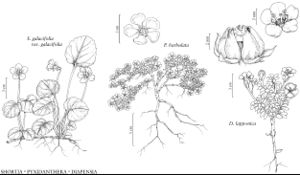Pyxidanthera
Fl. Bor.-Amer. 1: 152, plate 17. 1803 ,.
Subshrubs, creeping, mat-forming, caulescent, rhizomatous, from adventitiously rooted, slender, woody stems. Stems: main stems mostly prostrate to decumbent, branched; branches prostrate to decumbent. Leaves cauline, alternate, often densely congested, 2–7(–10) mm; petiole absent; blade narrowly oblanceolate to lanceolate or ovate-lanceolate, margins entire, apex acute, minutely apiculate, surfaces glabrous or hairy, appearing 1-veined. Inflorescences solitary flowers, usually at tips of short, leafy branches, sessile. Flowers: sepals connate proximally; petals connate in proximal 2/5–1/2, corolla rotate, 2–5 mm, lobes white, margins entire or slightly erose; anthers 2-locular, basally spurred, transversely dehiscent; filaments adnate to corolla tube; staminodes absent. x = 6.
Distribution
se United States.
Discussion
Species 2 (2 in the flora).
Selected References
Lower Taxa
Key
| 1 | Leaf blades narrowly oblanceolate to lanceolate, 3.5-7(-10) mm, those of fertile shoots ciliate along proximal margins, adaxial surface usually white-pilose on proximal 1/5-1/3. | Pyxidanthera barbulata |
| 1 | Leaf blades ovate-lanceolate to obovate-lanceolate, usually 2-4 mm, those of fertile shoots eciliate, adaxial surface white-pilose throughout. | Pyxidanthera brevifolia |
